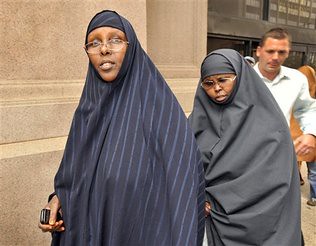
Two Somalian-American women, Amina Farah Ali and Hawo Mohamed Hassan, have been charged with providing money to Al-Shabaab from Somalia. Ali has now been charged with contempt of court and jailed for refusing stand for the judge., a photo by Pan-African News Wire File Photos on Flickr.
SOMALIA: US bank move highlights importance of remittances
Somalis abroad remit more than a billion dollars a year to relatives in their homeland
SOMALIA, 27 December 2011 (IRIN) - The welfare of hundreds of thousands of Somalis who depend on financial assistance from the diaspora is at risk following a decision by a US bank to close down accounts of Somali money transfer companies in the state of Minnesota by 30 December, according to local and international sources.
Somalis, both in Somalia and in the diaspora, have reacted with dismay at the move by Sunrise Community Bank, arguing that money transfer companies are a lifeline to millions of Somalis who depend on remittances for their livelihoods.
"After suffering conflict and famine, cutting off the only lifeline left for Somalis is tantamount to a death sentence for [many] Somalis," Ilmi Gedi, head of Qaran money transfer company (one of the largest in Somalia), told IRIN. "If the closure goes ahead, it will not only hit those whose families used to get money but also drought-and famine-displaced people supported by other Somalis."
Laura Hammond, a senior lecturer at the School of Oriental and African Studies in London, said the problem was serious with regards to Minneapolis (the largest city in Minnesota and home to an estimated 60,000-80,000 ethnic Somalis) but potentially not critical to remittance-sending from the rest of the USA.
However, Hammond said, if other US banks follow suit and close their doors to Somali money transfer companies, the situation would be very serious.
"The diaspora is one of the main lifelines to [people in] the famine areas and their support is more effective than that of most aid agencies because they are able to deliver funds to precisely where they are needed almost instantly," she said adding: "Aid agencies have technical expertise, but when it comes to getting money to where it's needed quickly they can't begin to compete with the diaspora.
"One of the cruel ironies of this famine is that the worst-affected areas are also those most conflict-prone, so funding is vital to precisely the areas that make banks nervous."
Big impact
It is estimated that US$1.3-2 billion per year is remitted to Somalia from around the world, Hammond said.
"In a `normal’ year, probably 10 percent of that goes towards `collective contributions’ - relief and development. In an emergency year, the amount of remittances goes up - by how much, we don't know - both to individual recipients and to community-based relief for internally displaced camps, feeding centres, etc," she said.
The impact of such a closure will be felt the most inside Somalia, where the UN estimates four million are in need of assistance - three million of them in southern Somalia, with 250,000 in famine affected areas at risk of starvation.
Madino Ji'ale Farah, a 65-year-old grandmother and resident of Mogadishu, told IRIN she and 13 members of her extended family were living on the $200 a month that one of her children sends regularly.
"We have no other income except our monthly bill from my daughter. We survive on this money and if it stops we have no other means," Jama said. "We would be forced to either go to the camps [for refugees and displaced people] or beg."
She said her daughter had warned her that she may not be able to send money next month.
Abdisalam Abdinur, 55, a father of five, depends on the $200 his 21-year-old son sends from Minneapolis. "If it stops we will have nothing else to live on."
Abdinur told IRIN stopping money transfers will make most Somalis depend on food handouts. "We already have too many waiting for food handouts. Why add to it? It is very cruel. Maybe they want us all to beg."
In a statement on 27 December, the Somali American Money Services Association (SAMSA) said it was concerned by Sunrise Community Bank's decision to close their accounts. It is estimated that in an average year, over US$100 million is transferred to Somalia through SAMSA from the USA.
Aid workers worried
On 23 December, Oxfam America and the American Refugee Committee (ARC) issued a statement decrying the move by Sunrise Bank.
"This is the worst time for this service to stop. Any gaps with remittance flows in the middle of the famine could be disastrous,” Shannon Scribner, Oxfam America’s humanitarian policy manager, said in the statement.
She called on the US government to give the bank assurances “that there will be no legal ramifications of providing this service to Somalis in need”.
Ken Menkhaus, Somalia expert and associate professor at Davidson College, North Carolina, was quoted as saying: “The 2011 famine in Somalia would have been far worse had it not been for the extraordinary mobilization of remittances sent by the Somali diaspora to both their extended families and to local charities - and all those remittances were sent through the `hawala’ system.”
SAMSA said money transfer operators were by far the main facilitators of aid and development funds for Somalia. “In addition to the needy Somalis, the Somali government, international NGOs, the UN and USAID [US Agency for International Development] use remittance operators to conduct their operations in Somalia.”
SAMSA said its members were fully compliant with all applicable state and federal laws and regulations, including all relevant provisions of the Bank Secrecy Act and the US Patriot Act.
This report does not necessarily reflect the views of the Pan-African News Wire
No comments:
Post a Comment